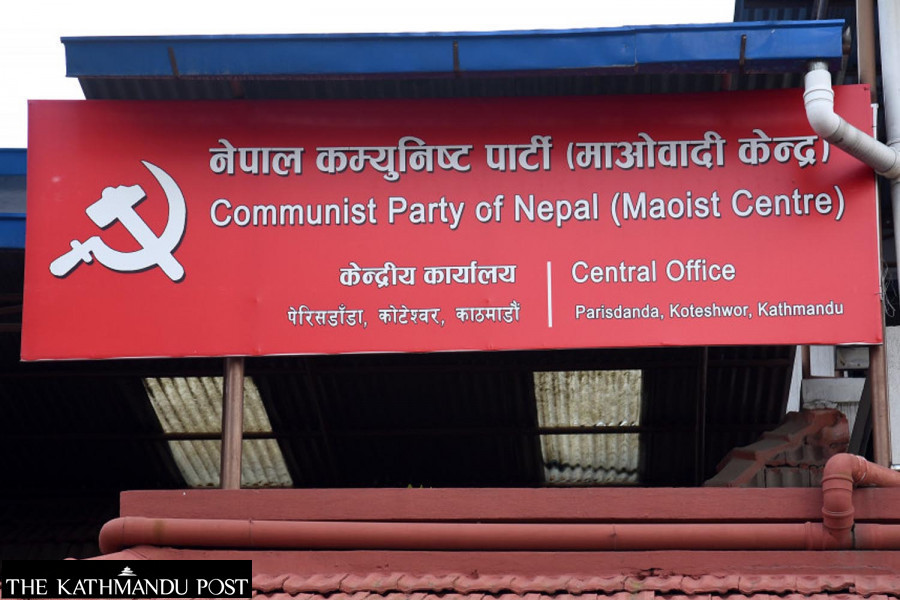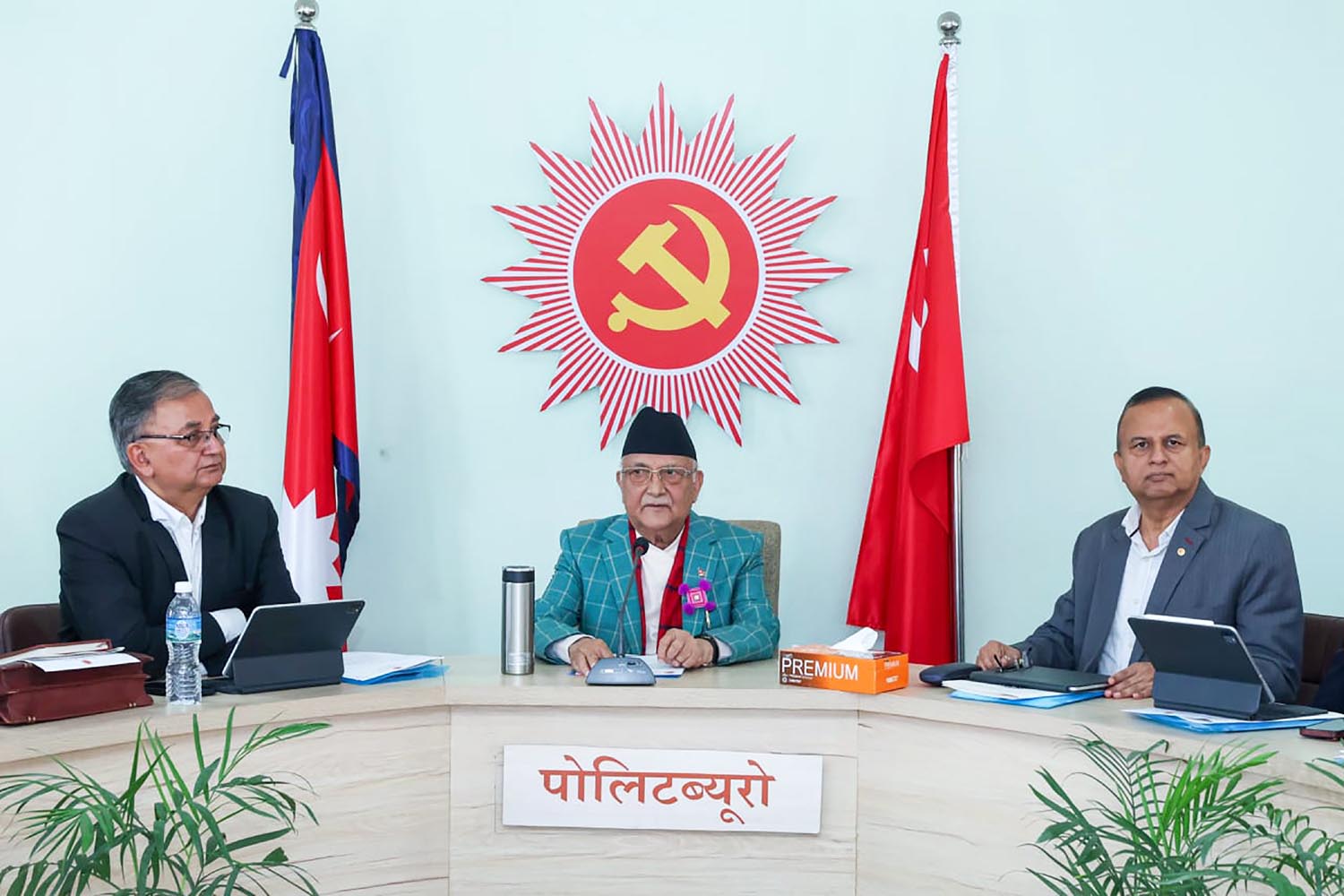Politics
Can Maoist Centre hold large-scale street protests it’s warning about?
The Maoist Centre simply does not have enough public support for a major agitation that has transpired in Nepal’s South Asian neighbours, analysts say.
Purushottam Poudel
During the two-day politburo meeting of CPN-UML, which started on Tuesday, party chair and Prime Minister KP Sharma Oli briefed members on the alleged attempts by CPN (Maoist Centre) and its chair Pushpa Kamal Dahal to destabilise the government.
“After being unseated from power, Dahal has been working to incite some groups to inflame the situation,” a politburo member of the party quoted Oli as saying. “But we won’t let him be successful.”
Oli further said that Dahal’s speech in the House of Representatives meeting on August 27 was intended to create chaos. While speaking in the House, Dahal had warned the government that a similar incident as in Sri Lanka and Bangladesh might occur in Nepal should the government try to bulldoze its way in the name of majority.
“It was not the language to be spoken by the responsible leader,” Oli reportedly said during the politburo meeting.
The Maoist Centre has seen its fortunes dwindle sharply over the years. The party, which got 29.28 percent of votes in the first Constituent Assembly election in 2008, could garner only 15.21 percent in the second Constituent Assembly of 2013. Even then, the party's downward journey did not stop. In the general election of 2017, the first after the country adopted the federal structure, the party was limited to 13.66 percent, which further declined during the November 2022 election to 11.13 percent.
These data show that public support for the Maoist Centre is diminishing. But rather than acknowledging this fact and focusing on reinvigorating the party’s lost connection with the public, the party leaders often warn of street protests whenever they have some grudges with the leaders of the Nepali Congress and CPN-UML, the two major parties of the country.
Political analysts say they do not see any point in leaders from the Maoist Centre and other parties harping on street protests.
“In the present context, no political party has any moral ground to bring the common people to the street—maybe a few of their cadres might gather,” Krishna Khanal, a professor of political science, told the Post. “When it comes to the Maoist Centre, they were just unseated from power, so the party might be trying to reinvigorate its members in the name of street protest.”
Khanal also says that the Maoist Centre has no moral ground to lead the mass protest. Referring to the latest election, Khanal adds that the Maoist Centre simply does not have enough public support for a large-scale protest.

Likewise, CK Lal, another political analyst who is also a columnist for the Post, also does not see any chance for the Maoist Centre to lead any movement.
“The Maoist Centre has been discredited because of what they did or didn’t do when they were in power, so I don’t see any chances that they will lead any kind of political movement as the kind that have happened in our South Asian neighbours,” Lal told the Post.
However, Maoist Centre leaders have been citing Bangladesh and saying that election results do not matter when organising a mass protest.
“Pressurising the government through the House and street is a declared policy of the party,” Dev Gurung, Maoist Centre general secretary, told the Post.
On Sunday, the Maoist Centre issued a circular to the party's provincial committees, asking them to be ready for street protests against the government at any time.
The circular, signed by party chair Pushpa Kamal Dahal and General Secretary Dev Gurung, instructs cadres to organise street protests if the government ignores the party’s warning at Parliament.
“The party should strongly present its stance in Parliament regarding the regression, treason, protection of corrupt people, and the daily problems faced by the people, among other things,” the circular states. “If the government continues to protect the corrupt people and defend treason, despite our strong voice, we need to consider going to the street any time.”
Party members are also instructed to oppose the KP Sharma Oli government “if it tries to obstruct the campaign of good governance that was started during the Dahal-led government.”
“The intention to block the anti-corruption campaign and protect the corrupt is clear evidence [that the government is on a wrong path],” the directive said.
Khanal, the political science professor, says that if the question of corruption can be raised to other political parties and leaders, the same can be done to Maoist Centre leaders and its chair, Dahal, who has been in power most of the time after the promulgation of the constitution in 2015.
The Maoist Centre alleges that the Congress and UML have agreed to amend the constitution and are trying to drive the country towards the 1990 constitution.
After the people's movement in 1990 against the 30-year Panchayat system, the country not only gained a democracy but also a constitution that valued constitutional monarchy.
“The way the two parties are considering amending the constitution, there is a sign that the country will return to 1990 by reversing the achievements of the federal democratic republic, secular, proportional-inclusive,” the party circular disseminated in the seven provincial party committees claims.
Despite being the third largest party (with 32 seats) in the House, Dahal, as the party's leader, became the prime minister for the first 18 months after the November 2022 election. He was unseated from power on July 12, when his chief coalition partner, UML, inked a seven-point agreement with Congress to form the government under the leadership of UML chair KP Sharma Oli.
When the Congress and the UML, the first and second largest parties (with 88 and 78 seats, respectively), inked a deal on July 1, they also agreed to amend the constitution, which is mentioned in the second point of the agreement as read out by Prime Minister Oli from the rostrum of Parliament on July 21 when he was seeking the vote of confidence.
After being unseated from power, the Maoist Centre and its leaders have come down heavily on the two parties and their deal. However, the seven-point agreement is not the only reason they are skeptical of the government, experts say.
After UML leaders began to accuse Maoist Centre leaders of electricity tariff corruption, they might have resorted to warnings of street protests, experts say. They add that there has been a heated debate recently between the lawmakers of UML and Maoists regarding how to acknowledge the 10-year insurgency, so that may be another reason Maoist Centre leaders are warning of street protest.
Political analysts say parties and their leaders should stand for their political convictions based on ideology but it is not a feature of coalition politics.
“In coalition politics, the opposition party warns the government of street protest,” Lal told the Post. “However, in reality, they tend not to be up to it.”




 8.79°C Kathmandu
8.79°C Kathmandu














